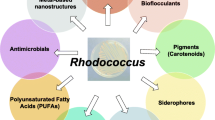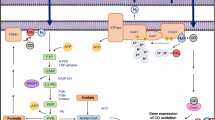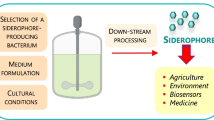Summary
Rhizoferrin is a novel carboxylate-type siderophore which has recently been isolated fromRhizopus microsporus and other fungi of the Mucorales (Zygomycetes). The present investigation shows that a variety of rhizoferrin analogs can be produced by directed fermentation. Thus both the diaminobutane backbone and the citric acid side chains of rhizoferrin have been substituted by diamine and citric acid analogs added to the culture medium. The new ligands as well as their iron complexes have been characterized by physicochemical methods. Conditions of precursor incorporation and implications for the biosynthesis of the new siderophores are discussed.
Similar content being viewed by others
References
Abdel-Monem, M.M., N.E. Newton and C.E. Weeks. 1974. Inhibitors of polyamine biosynthesis. 1. α-Methyl-(±)-ornithine. J. Med. Chem. 17: 447–451.
Atkin, C.L., J.B. Neilands and H.J. Phaff. 1970. Rhodotorulic acid from species ofRhodosporidium, Rhodotorula, Sporidiobolus, andSporobolomyces, and a new alanine-containing ferrichrome fromCryptococcus melibiosum. J. Bacteriol. 103: 722–733.
Bayer, E., B. Bauer and H. Eggerer. 1981. Evidence from inhibitor studies for conformational changes of citrate synthase. Eur. J. Biochem. 120: 155–160.
Bickel, G., G.E. Hall, W. Keller-Schierlein, V. Prelog, E. Fischer, A. Wettstein and H. Zähner. 1960. Über die konstitution von ferrioxamin B. Helv. Chim. Acta 43: 2129–2138.
Boelaert, J.R., M. Delocht, J. Van Cutsem, V. Kerrels, B. Cantinieaux, A. Verdonck, H.W. Vanlanduyt and Y.J. Schneider. 1993. Mucormycosis during deferoxamine therapy is a siderophormediated infection—in vitro and in vivo animal studies. J. Clin. Invest. 91: 1979–1986.
Boelaert, J.R., G.F. van Roost, P.L. Vergauwe, J.J. Verbanck, C.H. de Vroey and M.F. Segaert. 1988. The role of desferrioxamine in dialysis associated mucormycosis; report of three cases and review of literature. Clin Nephrol. 29: 261–266.
Davis, R.H., D.R. Morris and P. Coffino. 1992. Sequestered end products and enzyme regulation: the case of ornithine decarboxylase. Microbiol. Rev. 56: 280–290.
Deml, G., K. Voges, G. Jung and G. Winkelmann. 1984. Tetraglycylferrichrome—the first heptapeptide ferrichrome. FEBS Lett. 173: 53–57.
Drechsel, H. 1993. Dissertation. University of Tübingen, Germany.
Drechsel, H., S. Freund, G. Nicholson, H. Haag, O. Jung, H. Zähner and G. Jung. 1993. Purification and chemical characterization of staphyloferrin B, a hydrophilic siderophore from staphylococci. BioMetals 6: 185–192.
Drechsel, H., G. Jung and G. Winkelmann. 1992. Stereochemical characterization of rhizoferrin and identification of its dehydration products. BioMetals 5: 141–148.
Drechsel, H., J. Metzger, S. Freund, G. Jung, J.R. Boelaert and G. Winkelmann. 1991. Rhizoferrin—a novel siderophore from the fungusRhizopus microsporus var.rhizopodiformis. BioMetals 4: 238–243.
Haag, H., H.-P. Fiedler, J. Meiwes, H. Zähner, H. Drechsel and G. Jung. 1994. Isolation and biological characterization of staphyloferrin B, a compound with siderophore activity from staphylococci. FEMS Microbiol. Lett. 115: 125–130.
Konetschny-Rapp, S., G. Jung, J. Meiwes and H. Zähner. 1990. Staphyloferrin A: a structurally new siderophore from staphylococci. Eur. J. Biochem. 191: 65–74.
Lill, U., A. Bibinger and H. Eggerer. 1987. Hysteretic behaviour of citrate synthase. The reaction mechanism and the exclusion of synthase being a hysteretic enzyme. Eur. J. Biochem. 163: 599–607.
Lill, U., A. Schreil and H. Eggerer. 1982. Isolation of enzymically active fragments formed by limited proteolysis of ATP citrate lyase. Eur. J. Biochem. 125: 645–650.
Löhlein-Werhahn, G., E. Bayer, B. Bauer and H. Eggerer. 1983. Hysteretic behaviour of citrate synthase. Alternating sites during the catalytic cycle. Eur. J. Biochem. 133: 665–672.
Man, W.-J., Y. Li, D. O'Connor and D.C. Wilton. 1991. Conversion of citrate synthase into citryl-CoA lyase as a result of mutation of the active site aspartic acid residue to glutamic acid. Biochem. J. 280: 521–526.
Martinez-Pacheco, M. and J. Ruiz-Herrera. 1993. Differential compartmentation of ornithine decarboxylase in cells ofMucor rouxii. J. Gen. Microbiol. 139: 1387–1394.
Martinez-Pacheco, M., G. Rodriguez, G. Reyna, C. Calvo-Mendez and J. Ruiz-Herrera. 1989. Inhibition of the yeast-mycelial transition and the phorogenesis ofMucorales by diamino butanone. Arch. Microbiol. 151: 10–14.
McCann, P.P., A.E. Pegg and A. Sjoerdsma. 1987. Inhibition of Polyamine Metabolism. Academic Press, Orlando, FL.
Meiwes, J., H.P. Fiedler, H. Haag, H. Zähner, S. Konetschny-Rapp and G. Jung. 1990. Isolation and characterization of staphyloferrin A, a compound with siderophore activity fromStaphylococcus hyicus DSM 20459. FEMS Microbiol. Lett. 67: 201–206.
Meiwes, J., H.P. Fiedler, H. Zähner, S. Konetschny-Rapp and G. Jung. 1990. Production of desferrioxamine E and new analogues by directed fermentation and feeding fermentation. Appl. Microbiol. Biotechnol. 32: 505–510.
Pegg, A.E. 1986. Recent advances in the biochemistry of polyamines in eukaryotes. Biochem. J. 234: 249–262.
Pollack, J.R. and J.B. Neilands. 1970. Enterobactin, an iron transport compound fromSalmonella typhimurium. Biochem. Biophys. Res. Commun. 38: 989–992.
Pösö, H. and J. Hänne. 1976. Inhibition of ornithine decarboxylase activity and spermidine accumulation in regenerating rat liver. Biochem Biophys. Res. Commun. 69: 885–892.
Reid, R.T., D.H. Live, D.J. Faulkner and A. Butler. 1993. A siderophore from a marine bacterium with an exceptional ferric iron affinity constant. Nature 366: 455–458.
Rochel, N. 1993. Dissertation. Centre National de la Recherche Scientifique, Strasbourg, France.
Shanzer, A., J. Libman, S. Lifson and C.E. Felder. 1986. Origin of the Fe3+-binding and conformational properties of enterobactin. J. Am. Chem. Soc. 108: 7609–7619.
Smith, M.J., J.N. Shoolery, B. Schwyn, I. Holden and J.B. Neilands. 1985.Rhizobactin, a structurally novel siderophore fromRhizobium meliloti. J. Am. chem. Soc. 107: 1739–1743.
Stevens, L., I.M. McKinnon and M. Winther. 1977. The effects of 1,4-diaminobutanone on polyamine synthesis inAspergillus nidulans. FEBS Lett. 75: 180–182.
Tabor, C.W. and H. Tabor. 1985. Polyamines in microorganisms. Microbiol. Rev. 49: 81–99.
Thieken, A. and G. Winkelmann. 1992. Rhizoferrin: a complexone type siderophore of the Mucorales and Entomophthorales (Zygomycetes). FEMS Microbiol. Lett. 94: 37–42.
Thieken, A. and G. Winkelmann. 1993. A novel bioassay for the detection of siderophores containing keto-hydroxy bidentate ligands. FEMS Microbiol. Lett. 111: 281–286.
Tschierske, M., K. Goeke, H.P. Fiedler and H. Zähner. 1992. Desferrioxamine E—optimization of the production process and new hydroxamate-type siderophores obtained by precursor directed biosynthesis. In: Dechema Biotechnology Conferences (Kreysa, G. and Driesel, A.J., eds), 5: pp. 761–764, VCH-Verlagsgesellschaft, Weinheim.
Van Cutsem, J. and J.R. Boelaert. 1989. Effects of deferoxamine and iron on experimental mucormycosis (zygomycosis). Kidney Int. 36: 1061–1068.
Van der Helm, D. and G. Winkelmann. 1994. Hydroxamates and polycarboxylates as iron transport agents (siderophores) in fungi. In: Metal Ions in Fungi (Winkelmann, G. and D.R. Winge, eds), pp. 39–98, Marcel Dekker Inc., New York, Basel, Hong Kong.
Watson, J.A., M. Fang and J.M. Lowenstein. 1969. Tricarballylate and hydroxycitrate: substrate and inhibitor of ATP-citrate-oxaloacetate lyase. Arch. Biochem. Biophys. 135: 209–217.
Wells, T.N.C. 1991. ATP-citrate lyase from rat liver. Characterisation of the citryl-enzyme complexes. Eur. J. Biochem. 199: 163–168.
Wiebe, C. and G. Winkelmann. 1975. Kinetic study on the specifity of chelate-iron uptake inAspergillus. J. Bact. 123: 837–842.
Winkelmann, G. (ed.) 1991. Handbook of Microbial Iron Chelates. CRC Press, Boca Raton, FL.
Winkelmann, G. and D.R. Winge (eds.) 1994. Metal Ions in Fungi. Marcel Dekker Inc., New York, Basel, Hong Kong.
Author information
Authors and Affiliations
Rights and permissions
About this article
Cite this article
Drechsel, H., Tschierske, M., Thieken, A. et al. The carboxylate type siderophore rhizoferrin and its analogs produced by directed fermentation. Journal of Industrial Microbiology 14, 105–112 (1995). https://doi.org/10.1007/BF01569891
Received:
Accepted:
Issue Date:
DOI: https://doi.org/10.1007/BF01569891




